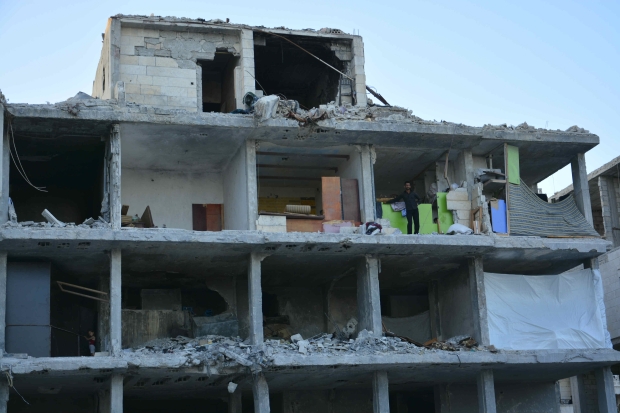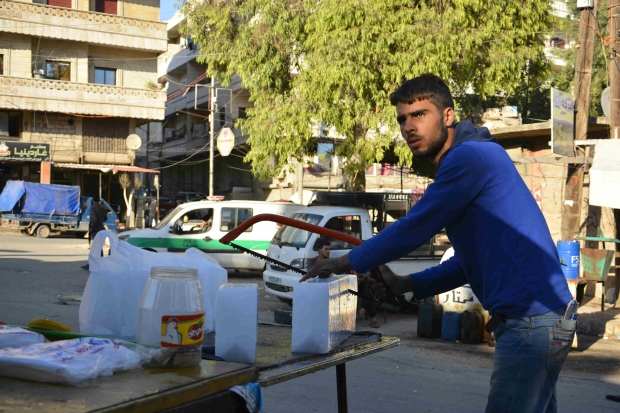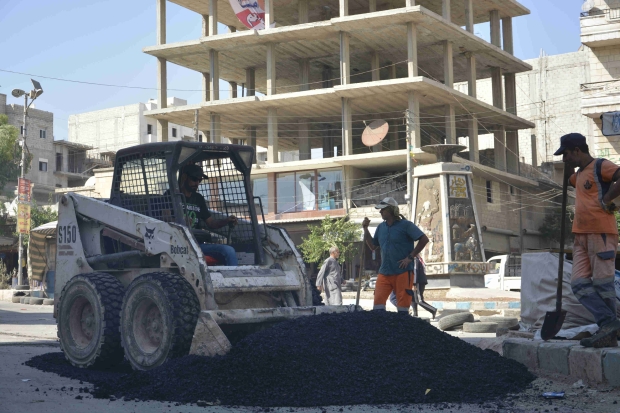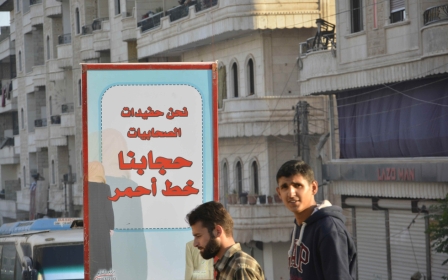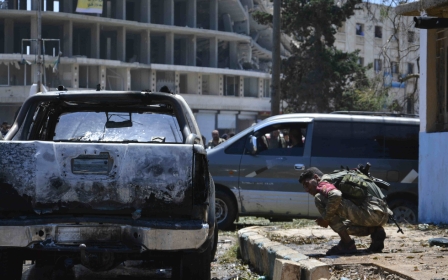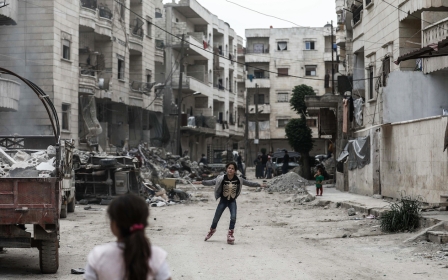Syrians displaced from Ghouta suffer in Afrin and long for home
AFRIN, Syria - Standing in his home in northern Syria's Afrin, Maher Suleiman has a fine view of the street below.
Not by design, or thanks to some panoramic windows. Simply because the facade of the building has been blown off.
"Look at this house, I do not know how I will live in the winter in it," Suleiman tells Middle East Eye.
"The walls are completely cracked. The air is coming in from everywhere. Will this building hold until winter?"
More than 300km from his original home, Suleiman is one of thousands of Syrians from the Damascus suburbs of Eastern Ghouta now living in Afrin.
In many ways Afrin has been kind to the people of Ghouta.
When the enclave fell to a pro-Syrian government forces assault in March, after five years of besiegement, most of its 400,000 people fled north to opposition-held areas such as Afrin, a city in Aleppo province.
The residents of the Ghouta were following a path well-trodden by Syrians from many other areas that were once held by rebel groups but have now fallen into Damascus' hands, places such as east Aleppo, Daraya, Moamadiyeh and Homs.
As a result, the population in rebel-held parts of northern Syria has swollen. In Idlib province alone, 1.3 million of the two million people there are Syrians displaced from elsewhere.
Suleiman's home consists of four rooms, two of which have been destroyed. The water pipes, power lines and sewage works are broken. He lives in two shattered rooms with his wife, four-year-old son and six-year-old daughter.
"An architect came and took a sample of the foundations of the building ... I hope they will carry out an operation to restore it," he says.
Afrin's people believe that we are taking over their property. But the truth is that we are forced to live in the north
- Maher Suleiman, displaced Syrian
The building's damage is evidence of another grim byproduct of the conflict – tensions between Afrin's majority Kurdish population and the Arabs who now reside there.
In March, the Turkish military and as many as 25,000 Free Syrian Army rebels seized Afrin and its environs from the Kurdish People's Protection Units (YPG), displacing at least 137,000 mostly Kurdish residents.
People from Ghouta such as Suleiman have taken up residence in some of the homes left empty by residents who fled the Turkish assault.
However, before pulling out of the city, the YPG left booby traps in many of Afrin's buildings. When one was tripped in the building Suleiman now lives in, the structure was devastated, leaving a chasm where the facade once was.
"There is a rift between the people of the area and the displaced. It may disappear over time," Suleiman says.
"Afrin's people believe that we are taking over their property. But the truth is that we are forced to live in the north.
"We have been forced to move. We cannot live under [Syrian President Bashar] al-Assad."
Street life
Suleiman, like many others from Ghouta, prefers to live in areas such as Afrin that are under control of rebel groups that are traditionally less hardline.
Much of Idlib province, for example, is under the control of al-Qaeda’s former Syrian branch, Hay'at Tahrir al-Sham.
Yet where the displaced settle often depends on where they find work, with people moving between Idlib and Aleppo provinces in search of opportunities and employment just to be able to survive.
On a street in Afrin city's centre, former Ghouta resident Ahmad al-Dabbak carves lumps of ice off a large block on a table, ready to sell to passers-by sweltering under the Syrian summer sun.
For now it helps him to pay his expenses, but it cannot last.
"I would like to find work in my profession, which is building, then I won't have to sell ice again," he tells MEE.
"It is temporary work, because in the winter no one needs cold water, and electricity will probably be repaired and connected up to the homes."
Suddenly the 24-year-old turns to a customer, who is trying to pay less than the asking price for Dabbak's ice.
"This piece costs 200 Syrian pounds [39 US cents], I cannot sell it for less than that," he says, before eventually settling on 150 pounds.
Dabbak says this doesn't even add up to half of his daily expenses.
"I have a newborn. No one else works in the family."
Dabbak lost his brother during the recent military campaign on Eastern Ghouta and lives in Afrin with his mother, wife and three children in one house, where his brother's wife also lives with her two children.
What shame of the factions that failed the cradle of the revolution, Daraa, such as they failed us in Ghouta
- Ahmad al-Dabbak, displaced Syrian
Like many others in opposition-held northern Syria, Dabbak has watched the other remaining rebel stronghold Daraa fall into Damascus' hands with sadness and trepidation.
"What [a] shame of the factions that failed the cradle of the revolution, Daraa, such as they failed us in Ghouta," he says.
"Perhaps it was destined for the people of Daraa to be displaced, as was our fate."
So far, the Syrian government has not offered the people of Daraa – hundreds of thousands of whom have been displaced in fighting in recent weeks - passage to the north, as it has with other places it won back.
In fact, local media have reported that Assad's ally Russia told rebels in the south to avoid heading to Idlib, warning that it would be next area to be attacked.
But with the opposition-held north already brimming with Syrians displaced from elsewhere, many are fearful of the effects that another wave of people could have on housing and employment.
"I do not know what will happen to the people of Daraa when they reach the north, what they will do?" Dabbak says. "It is difficult to find a place to live."
Assistance on its way
According to the statistics of the East Ghouta Displacement Authority in Afrin, a voluntary group, 7,000 families displaced from the Damascus suburbs now reside in the northern city.
Many are suffering, with 3,000 of those families failing to receive aid for two months.
"The situation of IDPs [internally displaced people] is poor," Bebars Zein, one of the founders of the East Ghouta Displaced Organisation, tells MEE.
When aid does arrive, which Zein says is primarily thanks to a number of Turkish organisations, civilians are categorised by the terms of their need, with orphans, widows and the wounded prioritised.
Inside the East Ghouta Displacement Authority's office, Hazem Jebel, who lost a leg in the battles east of Damascus, is writing down his personal details, hoping to be helped. He tells MEE he was given an artificial limb in Idlib, but it did no good and caused his knee to swell.
"We hope to provide services to all, especially patients with previous injuries or permanent disabilities," says Zein.
According to Jassem al-Safira, director of Afrin local council’s services office, the Turkish government is directly supporting projects to improve services in the area, including repairing public roads and renovating the drinking water network and public gardens.
I will return there after Assad's departure. I will marry my son in Ghouta
- Maher Suleiman, displaced Syrian
Not only beneficial by fixing up a city that has largely been spared the worst of the fighting but nonetheless is scarred by the war, Safira adds that the projects provide employment opportunities for the huge numbers of displaced people.
The repairs are expensive, however, and the local council lacks the funds to embark on all the projects it wants to carry out.
For Suleiman, this means he's left to repair his home alone, which he tries to do despite few materials and even less money.
"I have been used to living in destroyed homes. The warplanes destroyed my house in Eastern Ghouta," he says.
"It was wonderful and a paradise, even though it was completely destroyed. I will return there after Assad's departure. I will marry my son in Ghouta."
New MEE newsletter: Jerusalem Dispatch
Sign up to get the latest insights and analysis on Israel-Palestine, alongside Turkey Unpacked and other MEE newsletters
Middle East Eye delivers independent and unrivalled coverage and analysis of the Middle East, North Africa and beyond. To learn more about republishing this content and the associated fees, please fill out this form. More about MEE can be found here.


